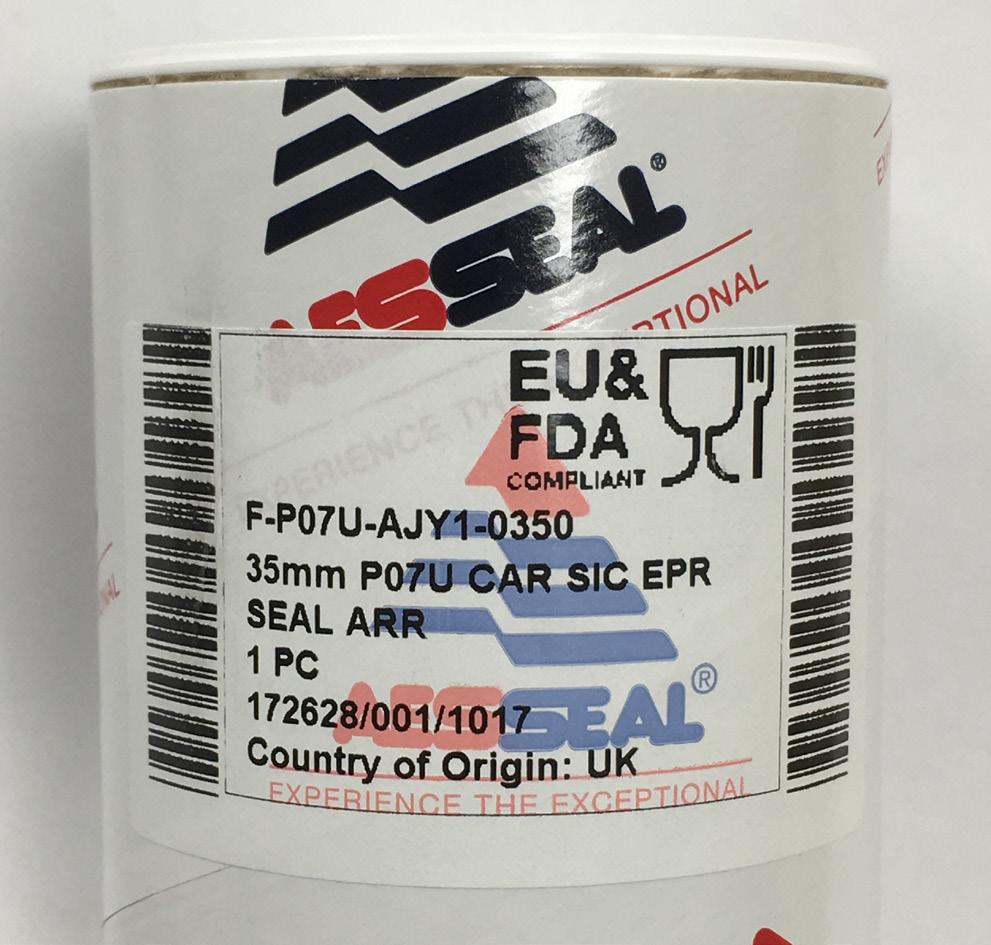
3 minute read
Check your labels to ensure compliance
John Smiddy, European Sales and Technical Support Director for AESSEAL, explains how mechanical seals can pose a serious contamination risk on pharmaceutical production lines – and how that risk can be avoided.
Mechanical seals play a crucial role in pharmaceutical production – preventing leakages from process pumps which could lead to costly downtime and product loss.
Advertisement
Yet, because they are component parts, seals are often overlooked when it comes to compliance with Food and Drug Administration (FDA) regulations and pharmaceutical Current Good Manufacturing Practice (CGMP).

As a result, many manufacturers are unwittingly specifying mechanical seals manufactured from non-safe materials and this creates a very real risk of contamination.
There is routine crossover between the chemical compounds and ingredients used in pharmaceutical, biopharmaceutical and the food & beverage sectors – the use of the dairy by-product β-lactose as an excipient is one typical example. So, it does make sense that both CGMP and the regulations governing food contact materials (FCMs) must apply with equal weight in both sectors.
Regulation (EC) 1935/2004 on FCMs is unequivocal: “A name, reference number and batch or delivery number should identify each raw material, so that it can be traced, if necessary. The traceability of raw materials is achieved throughout the production chain and inhouse by the delivery and/or batch reference numbers.”
In other words, every component in contact with an active pharmaceutical ingredient (API) must be 100% traceable and a statement of compliancy must be clearly marked on its packaging. That includes mechanical seals.
SOURCE MATERIALS
The main problem lies in the complexity of source materials and supply chains. There are, for example, around 15 grades of carbon commonly used in the manufacture of seal faces, of which only a handful are compliant with FDA standards. Of the remainder, some are suited to chemical applications and do not require FDA compliance, and finally there are antimony carbons, which are used in the oil and gas industry. Put simply, these are poisonous and should never appear anywhere near pharmaceutical industry pumps. Despite this, we have seen this type of carbon being used on pump systems within pharmaceutical sites.
It is important to be aware that component seals being imported into Europe from Asia can have been through so many links in the supply chain, that when it reaches its final destination, any traceability may be lost.
Crucially, a seal made from unsafe materials will look identical to a seal which is 100% compliant. They can only be differentiated if their traceability is clearly stated on their packaging.
As a result, a pharmaceutical company which otherwise carries out stringent checks at every step of production might be unaware that there are a number of points of potential contamination risk – one for every pump fitted with non-compliant mechanical seals.
There are genuine reasons why companies fail to tackle this and that is down to risk. A lack of awareness, as well as poor communication between those responsible for compliance with FDA and EU regulations and operatives at the ‘repair and replace’ end of production.
But Regulation EC1935/2004 is clear – a mechanical seal is non-compliant if traceability is not visibly evidenced on the packaging and it should not be installed on a pharmaceutical production line.
The conclusion is surely that, to avoid both the risk of contamination and of falling foul of the law, always look at the label! And, if a seal comes in packaging that does not clearly state its source, don’t use it. chevron-










